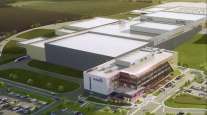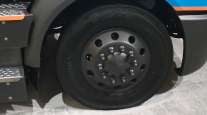Contributing Writer
2021 Expected to Be Pivotal Year for Commercialization of Electric Vehicles

[Stay on top of transportation news: Get TTNews in your inbox.]
With major truck manufacturers pushing into factory-built electric vehicles, 2021 is poised to be the year for the technology to transition from pilot testing to commercialization.
Volvo Trucks North America next month plans to begin sales of its VNR Electric regional Class 8 truck, a model that is being deployed in Southern California for regional freight distribution and drayage as part of a program funded through a combination of federal and regional environmental grants.
There are 70 trucks in this initiative, with NFI Industries and Dependable Supply Chain Services, a division of DHE, among those testing the units.
VTNA plans to launch full-scale production of the VNR Electric at its New River Valley manufacturing plant in Dublin, Va., early next year. Sales efforts kick off Dec. 3.

Voorhoeve
“We are ready to bring a complete electric-truck solution to the market for our customers and are fully confident in delivering them the total package of support and service, not just the truck itself,” Peter Voorhoeve, president of Volvo Trucks North America, told Transport Topics.
It is part of what Volvo considers a global shift to “sustainable transport,” the company said.
Rival Daimler Trucks North America starts 2021 with 38 electric trucks in service, including 26 Class 8 Freightliner eCascadias and another 12 medium-duty Freightliner eM2s. Clients testing the trucks include a wide range of private fleets and motor carriers, including UPS, Costco, Sysco, J.B. Hunt Transport Service and Knight-Swift Transportation.
Combined, these trucks have about 500,000 miles of service, roughly the same as the useful life of a single Class 8 diesel tractor. Daimler’s electric fleet will compile hundreds of thousands more miles in 2021 as the company gets ready to start assembling the production version of the trucks in 2022.

Howard
“There are no shortcuts to delivering safe, reliable, dependable trucks. Real customers, running real freight against the rigors of multiple scenarios is the only path to an electric future,” Richard Howard, senior vice president of on-highway sales and marketing for DTNA, said in a statement.
The eCascadias are collecting miles running local and regional distribution and drayage operations. The eM2s are Classes 6 and 7 trucks used in local distribution and food and beverage delivery.
Among other manufacturers, Tesla plans to launch production of its semi-tractor after several years of delay, and BYD is now in talks with multiple customers about orders that range into the hundreds of trucks.

Gillmore
“We are at the stage where we are putting real trucks into service with real fleets,” said Aaron Gillmore, vice president of BYD Motors’ U.S. electric truck division. Fleets are starting to become comfortable with the electric trucks’ performance, giving them the confidence to deploy them in greater numbers, he said. Corporate and private fleets will be the early buyers because they hold onto their vehicles longer than motor carriers, Gillmore said, which he noted allows fleets to recoup the higher purchase expense of electric trucks through lower cost of operations when compared to diesel tractors.
With e-commerce booming, manufacturers including Ford and Mercedes-Benz are readying light- and medium-duty electric cargo vans. Plus, Amazon is testing electric vans from startup Rivian and plans to have 10,000 on the road by 2022.
“In 2021, we’ll see manufacturers come forward with real products for real customers,” said Mike Roeth, executive director of the North American Council for Freight Efficiency. “And they’ll start to look at where around the country to put them.”

Roeth
The deployment will extend beyond California, where the pilot projects have taken place, Roeth added.
In the meantime, the industry will be watching attentively for Tesla’s first commercial trucks, he said.
“If Tesla can deliver on its projections for range, charging times and cost, [it] will be a game-changer,” Roeth said.
Momentum for electrification is advancing in the trucking and logistics industries in part because the sector is transitioning from retrofitted vehicles and early prototypes to holistically engineered production models, said Chris Wessel, senior manager of U.S. fleet at DHL Express.

Wessel
“It seems like we’re maybe [at] a tipping point here,” he said.
DHL started testing electric trucks about a decade ago with retrofitted electric vans, but having major manufacturers with extensive parts and service support enter the market will help build industry confidence in the technology, he said.
Most of the electric vehicles DHL uses are cargo vans, but the delivery company is placing four BYD Class 8 battery-electric trucks into service in Los Angeles in time for the peak holiday shipping season.
The company wants to reduce its logistics-related emissions to net zero by 2050, Wessel said.
“We certainly see the benefits and the cost benefits of moving to an EV fleet, particularly as the technology gets better and better,” he said.
Want more news? Listen to today's daily briefing:
Subscribe: Apple Podcasts | Spotify | Amazon Alexa | Google Assistant | More




